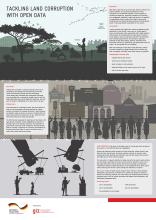/ library resources
Showing items 1 through 6 of 6.Open Data is data that can be freely used, shared and built-on by anyone, anywhere, for any purpose. Open Data is widely considered to be an effective response to land corruption by increasing transparency, supporting innovation and increasing civic engagement.
We’re pleased to share the Land Portal Foundation's 2018 Annual Report. The report demonstrates how we are working to create a vibrant information ecosystem on land that contributes to better informed decisions and policy making on land throughout the world.
A community’s choice to give, or withhold, their free, prior and informed consent (FPIC) to a project or activity planned to take place on their land is a recognized right of Indigenous peoples under international law.
Indonesia comprises more mangroves than any other country, but also exhibits some of the highest mangrove loss rates worldwide. Most of these mangrove losses are caused by aquaculture development.
L’étude a analysé dans 31 pays l’état de la reconnaissance juridique des droits des peuples autochtones, des communautés locales et des populations afro-descendantes sur le carbone présent sur leurs terres et territoires.
In the recent past, high profile cases involving land governance problems have been thrust into the public domain. These include the case involving the grabbing of a playground belonging to Lang’ata Road Primary School in Nairobi and the tussle over a 134 acre piece of land in Karen.
Land Library Search
Through our robust search engine, you can search for any item of the over 73,000 highly curated resources in the Land Library.
If you would like to find an overview of what is possible, feel free to peruse the Search Guide.






